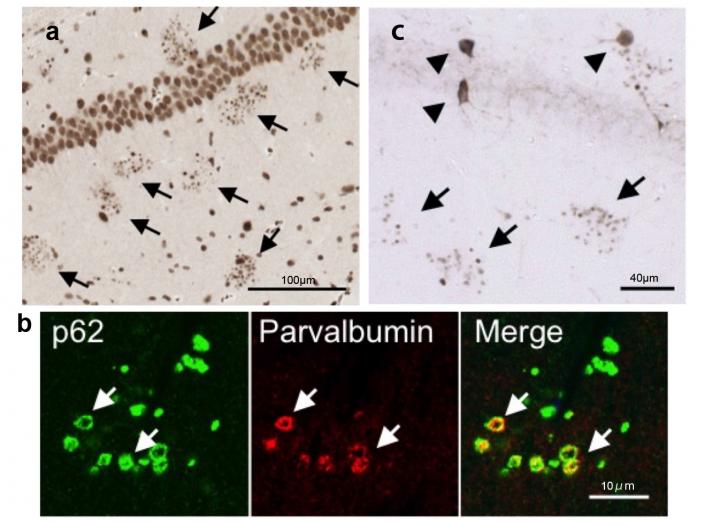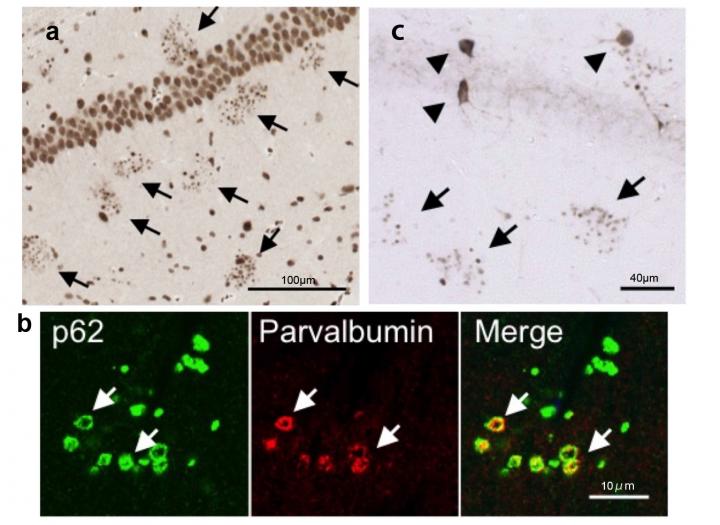
Credit: Hitomi Tsuiji and Koji Yamanaka
Nagoya, Japan – Neurodegenerative diseases are incurable and debilitating conditions that result in progressive degeneration and death of nerve cells, which leads to problems with movement or mental functioning. Examples include Alzheimer's, Parkinson's, amyotrophic lateral sclerosis (ALS) and frontotemporal dementia (FTD). ALS is characterized by degeneration of motor neurons, while FTD is characterized by progressive neuronal loss mostly in the frontal and/or temporal lobes of the brain.
Neurodegenerative diseases are increasingly being realized to have common cellular and molecular mechanisms including protein misfolding and aggregation. In nearly half of all FTD cases and in 97% of the ALS cases, there is an accumulation of the protein TDP-43 in the affected neurons, the basic working units of the nervous system.
In a non-disease state, TDP-43 is an important protein involved in various aspects of the metabolism of RNA, a molecule essential in various biological roles in the regulation and expression of genes. In a disease state, several mutations in TDP-43 have been identified as a cause of some hereditary and sporadic ALS and FTD cases. While this underscores the critical role of TDP-43 in the development of these conditions, the specific effect of aging on TDP-43 has not been investigated. This prompted a team of scientists centered in Nagoya, Japan, to delve deep into the subject. Their findings were recently published in Scientific Reports.
For their investigation, the researchers first developed a disease model of transgenic mice expressing elevated levels of TDP-43 to capture the pathology of sporadic ALS/FTD. They then performed serial behavioral tests on the mice, including Y-maze test (to assess working memory), rotarod test (motor function and learning), and contextual and cued fear condition test (fear learning and memory).
"In transgenic mice expressing unusually high levels of TDP-43 we observed memory and motor deficits," study corresponding author Koji Yamanaka says. "We also noticed an accumulation of debris of interneurons – the cells that serve as a connection between sensory and motor pathways for reflexes – in the hippocampus, which is responsible for memory storage."
Notably, the abundance of aggregates drastically increased with age and with the overexpression of TDP-43. Gene analyses of the hippocampus and other brain areas revealed dysregulation in the genes linked to manifestation of damaging reactive oxygen species and neuronal function.
"The degeneration of interneurons as seen in our mouse model could be the very early age-accelerated changes observed in the diseases," Yamanaka says. "Moreover, it has been reported that inhibitory interneuron deficits link altered network activity and cognitive dysfunction in models of Alzheimer's disease. Therefore, this particular mouse model may be useful for studying neurological diseases accelerated by aging."
###
The article, "TDP-43 accelerates age-dependent degeneration of interneurons" was published in Scientific Reports at DOI: 10.1038/s41598-017-14966-w
Media Contact
Koomi Sung
[email protected]
@NU__Research
http://www.nagoya-u.ac.jp/en/
Original Source
http://en.nagoya-u.ac.jp/research/activities/news/2017/11/deadly-combination-in-neurodegenerative-diseases-revealed.html http://dx.doi.org/10.1038/s41598-017-14966-w





